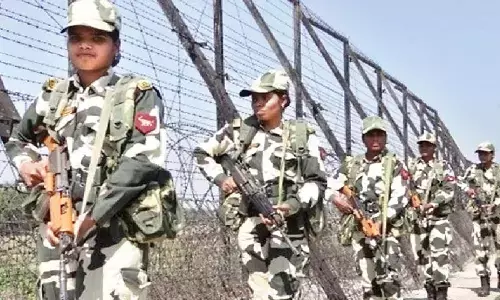AAP Tsunami origin local, but effects can be felt miles away

AAP Tsunami origin local, but effects can be felt miles away, It is not usual for nations to adopt New Year resolutions. But we in India are not living in the usual times. The oldest political party in the country has been reduced to the third place in the national capital's assembly.
.jpg) It is not usual for nations to adopt New Year resolutions. But we in India are not living in the usual times. The oldest political party in the country has been reduced to the third place in the national capital's assembly. And, it is supporting from outside the government formed by a one-year-old political party which does not even have a nationwide presence. But, as we learnt in 2004, a tsunami's origins are always local and yet the effects can be felt at long distances.
It is not usual for nations to adopt New Year resolutions. But we in India are not living in the usual times. The oldest political party in the country has been reduced to the third place in the national capital's assembly. And, it is supporting from outside the government formed by a one-year-old political party which does not even have a nationwide presence. But, as we learnt in 2004, a tsunami's origins are always local and yet the effects can be felt at long distances.So, revisiting India's national interests may be not only desirable but indeed mandatory as we transition from 2013 to 2014 and the general election bugle has been all but sounded.
All aspects of societal existence - ranging from physical well-being, prosperity, creature comforts, territorial ownership, health, education, intellectual pursuits, culture, tradition, peace, tranquillity, contentment and the like are covered by the notion of security. At the national level, security is the most primary responsibility of the government. And the index of security is not only the sum total of the individual strength areas but also the credibility of each as well as of the whole.
Economic considerations have determined the actions of man, and of the state, all along history. Today, the strength and potential of India's economy are acknowledged but both are substantially countervailed by the adverse reputation built up for inefficiency, inconsistency, corruption and lack of accountability - systemic as well as individual.
The ability to safeguard one's territorial integrity is the most visible yardstick to measure a nation's strength. Very seldom have nations come to an agreement on adjustment of their shared boundaries through peaceful, harmonious and mutually accommodating dialogue. This is a part of human nature and has nothing to do with the legality, morality or validity of the arguments put forward.
The armed forces of a nation are universally seen as the last bastion of national security as well as the most effective instrument of projecting national power. Down history, every nation has recognized and acknowledged the sacrifice of its personnel in uniform who accept curtailment of many of the constitutional rights that are enjoyed by every other citizen. Every civilized society makes much of them because their debt can never be fully repaid. It can, must be and indeed is recompensed, albeit only to a limited extent, by the indebted nation through upholding the honour of armed forces personnel. As an organization, armed forces personnel look up to the government of the day, therefore to every government, and to the political leadership across the spectrum of politics to uphold their honour in absolute as well as in relative terms.
The societal framework of checks and balances ensures that good prevails over bad in the long run. The concept of written law was homegrown from the times of Chanakya, but its practice took firm root and widespread application only after the British arrived. The law of the land, as it exists today, is perhaps neither inadequate nor deficient. Its utility, however, lies not inside the covers of the statute but in its application. The exotic fabric of our society, woven over half a century of centuries (5000 years), is in danger of coming apart not because its strands are weak but because its framework is coming loose.
If governance is the link joining all aspects of the national endeavor, it is also emerging as the nation's weakest spot. Inconsistency, corruption at different levels of administration, absence of accountability and readiness to bend any rule for personal aggrandisement have been a constant through the Congress, Janata Party, Third Front, BJP, NDA and UPA-led alliances and only increased with the passage of time. The government's readiness to take over or interfere in established as well as nascent institutions inhibits them from taking root and flourishing as centres of excellence. In such a dispensation, the performance balance-sheet of the administration reflects neither the immense resource pool nor the potential of our billion-plus nation.
Since Independence, there has been a lot of lip service in favour of education. But literacy for all, mass-scale vocational training and development of world class educational institutions are very far from being achieved. In fact, a campaign needs to be launched, seriously and with resolve, concurrently in all three dimensions of education to revolutionise society.
As the Delhi assembly election results have shown yet again, the public today is far more perceptive, alert and conscious of the goings-on as well as of their consequences. It is outraged by the politicization of criminal issues, whether these relate to billions of rupees stashed away or to inciting communal passions in pursuit of vote banks. The largest democracy on this earth owes to itself a secure, prosperous and orderly society whose administration is effective; where transgression of values-held-close is dealt with only in accordance with the law of the land, and not by khap panchayats or by hoodlums in the garb of self-appointed custodians of public morality.
If this can be ensured, economic growth, empowerment of deprived sections, healthcare, education, development and, infrastructure would all follow. Only with the credibility of our own governance and of our institutions would we get a greater say in the international regulatory mechanisms and a place at the global high table. And the process would inherently bolster and enhance every dimension of national security.
To sum up, India's national interests are:
* Governance, which means drawing up of policies and regulatory mechanisms. But it does not include the running of businesses, commercial enterprises and industries.
* Unexceptionable rule of law, which means close monitoring of compliance with the policies, regulatory mechanisms and codes of conduct. But it does not include administration through patronage or arbitrary exercise of powers.
* Inclusive growth, which means levelling the playfield wherein every individual and enterprise gets a fair opportunity to participate and succeed. But it does not include playing votebank politics, selected sponsorship, nepotism or favoritism under one fancy name or another.
* Education, which means providing encouragement for growth of schools, colleges and universities. But it does not include allowing mushrooming of sham institutions that conform to no standards but only make money for their propagators.
* National Security, which means ab initio integrally weaving of those elements, mechanisms and frameworks that would ensure economic, financial, technological, industrial, territorial and social security of the nation. But it does not include episodic displays of frivolous, incomplete and insufficiently thought out responses. It requires the integration of the armed forces into the national security policy formulation.
* Institution Building. This is a very serious responsibility of the government to provide a congenial environment for all institutions, both public and private, to flourish. Every institution takes ages to take root and mature, be it the office of a functionary or seat of learning or a think tank or any other. But it does not take long at all to demolish any of them. The immense powers vested in the government, therefore, must be exercised with utmost restraint, maturity and responsibility. Institution building rejects the myopic identification of individual with the institution as well as the increasingly exercised expedient of undermining the institutions.
As the big boys and the new kid on the block alike draw up their respective manifestos and also start firming up their batting line-ups, it may be useful to acknowledge that the national interests listed above are entirely consistent, harmonious and congruent with the priorities and perceptions of the mango people today
Next Story








